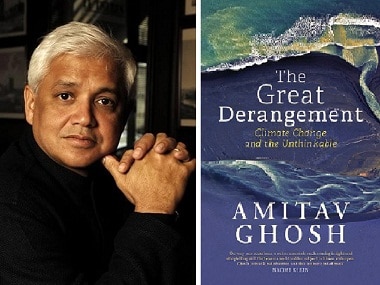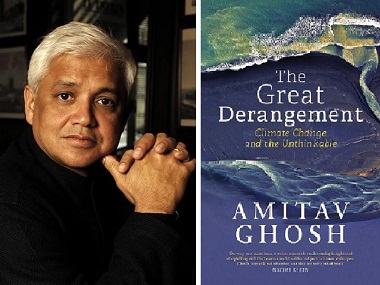Like almost everyone who was in Mumbai on 26 July 2005, I remember the day in sodden detail. I had taken a look at the bleak sky outside and decided to spend the day reading in my ground-floor room. By early afternoon, the water outside my door had risen almost to the lip of the corridor. This had happened before during heavy rains, so it was no cause for alarm. By the time I finished the book a couple of hours later, the water had breached my doorstep. It rose quickly. Soon, I was using a floating foam mattress as a raft for books while I splashed around trying to move my belongings as close to the ceiling as possible. In the end I got off lightly compared to many others, but I’ve always wondered at my choice of reading that day — Amitav Ghosh’s The Hungry Tide. [caption id=“attachment_2974486” align=“alignleft” width=“380”]  Amitav Ghosh (L); Cover of ‘The Great Derangement’[/caption] A coincidence like that in a literary novel could lead to significant eye-rolling. A deluge feels like a contrived plot device, not to even mention the overcooked symbolism of the book’s title. Making them plausible would take an enormous effort in the ‘set up’. This may be one of the reasons, Ghosh says in his latest book, that serious fiction has found it difficult to deal with the subject of the climate crisis that is upon us. “Considering what climate change actually portends for the future of the earth,” he says, “it should surely follow that this would be the principal preoccupation of writers the world over—and this, I think, is very far from being the case.” Later, he asks: “Is it possible that the art and literature of this time will one day be remembered […] because of their complicity in the Great Derangement?” The question sets off a wide-ranging enquiry into how humankind got here. Ghosh argues that the thinking that shaped the conventions of modern literary fiction and art is not different from the patterns of thought that have led us to this precipice. In the sciences, the idea that the natural world moves gradually (rather than through sudden plot twists) came to the fore in the last couple of centuries. It also became easier to imagine the modern condition of life as led in well-ordered surroundings, largely unaffected by natural forces. The individual who lived here struggled mostly against herself or society. Or, to be hippie about it: we lost touch with nature. Ghosh points out with incredulity and concern that this gives us things like crowded coastal cities where we pay large sums to live as close to the sea as possible even as hurricanes and storms increase in frequency and intensity. Ghosh’s analysis is intricate and erudite, and for the most part defies easy summary. He builds arguments by bringing together personal stories, folklore, the work of writers, anthropologists, philosophers, scientists, economists, ecologists, historians, and even the pope. In a fascinating section, Ghosh recalls seeing a complex of pagodas and monasteries in Burma that seemed in utter harmony with their landscape, leading to the idea (via the anthropologist Eduardo Kohn) that our surroundings might ‘think’ through us. This raises the possibility that climate change might be more effectively communicated through images rather than “our accustomed logocentrism”. (And though Ghosh doesn’t say so, there’s a pretty basic failure of logos in those tepid terms we use—‘global warming’ sounds distinctly cosy, and ‘climate change’ calls for a cardigan rather than an effort to avert catastrophe.) Elsewhere in the book, Ghosh brings up the historian Sanjay Subrahmanyam’s work on how modernity didn’t flow from the West to the rest, but instead emerged independently in different parts of the world. This he connects with pre-colonial Asia’s use of coal and natural gas to ask if imperialism might actually have retarded climate change by reining in industrial development in Asia and Africa. His answer: almost certainly, yes. _Also read — Amitav Ghosh: 'The threat of climate change is real, and it is intensifying'_ By its very nature, such analysis is open to — and provokes — debate. This is a good and necessary thing because it frees us to think of climate change in terms other than the personal-moral — ‘Should I give up air travel?’ — and the scientific-technocratic — two degrees, parts per million of carbon, solar panels, etc. While both those modes are essential, they can also seem bewildering or hopeless, causing us to stick our heads right back in the sand. Instead, an approach like Ghosh’s shows that we can come at the spectre of the climate crisis from almost anywhere we stand. Which is why I found it curious that Ghosh more than once brings up the matter of ‘serious fiction’ and its upturned nose. To bring up climate change in a novel, Ghosh writes, “is in fact to court eviction from the mansion in which serious fiction has long been in residence; it is to risk banishment to the humbler dwellings that surround the manor house…” But why take serious fiction so seriously? After all, its conventions don’t have a monopoly on human imagination. The lines between categories of fiction are blurry at best, and if something called science fiction or climate fiction can better accommodate what is urgent, then maybe we should let it. As Carolyn Kormann wrote in a 2013 survey of climate-change novels, “Today, novels that would once have been called science fiction can be read as social realism.” That might be even truer of tomorrow. Is it possible that non-fiction is in some ways better-suited for imaginative writing around the climate crisis? The Great Derangement’s imagining of a powerful cyclone striking Mumbai might have been as chilling in a work of fiction, but here I found myself wanting it straight. Knowing just how the scenario was arrived at, who the experts were, what the chances are, was a source of both dread and grim comfort. And I suppose it helped that, like so many others around the world, I didn’t need a fictional stand-in to feel the waters rising around me. The Great Derangement: Climate Change and the Unthinkable Amitav Ghosh Penguin Random House India; 2016; 275 pages
An approach like Amitav Ghosh’s, in his new book The Great Derangement, shows that we can come at the spectre of the climate crisis from almost anywhere we stand
Advertisement
End of Article


)
)
)
)
)
)
)
)
)



